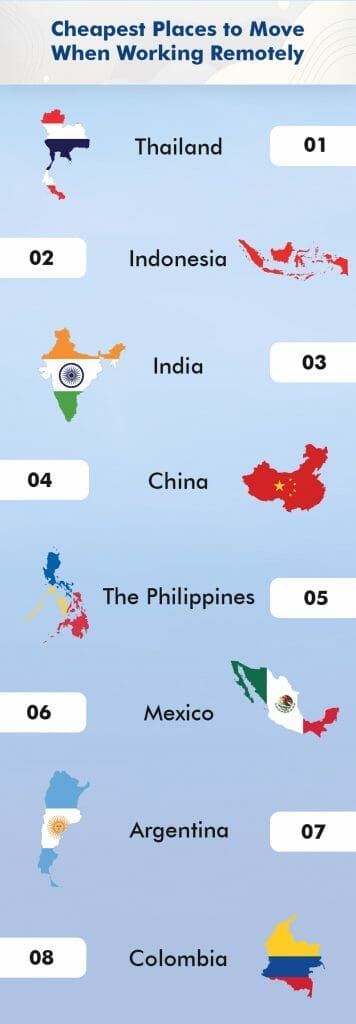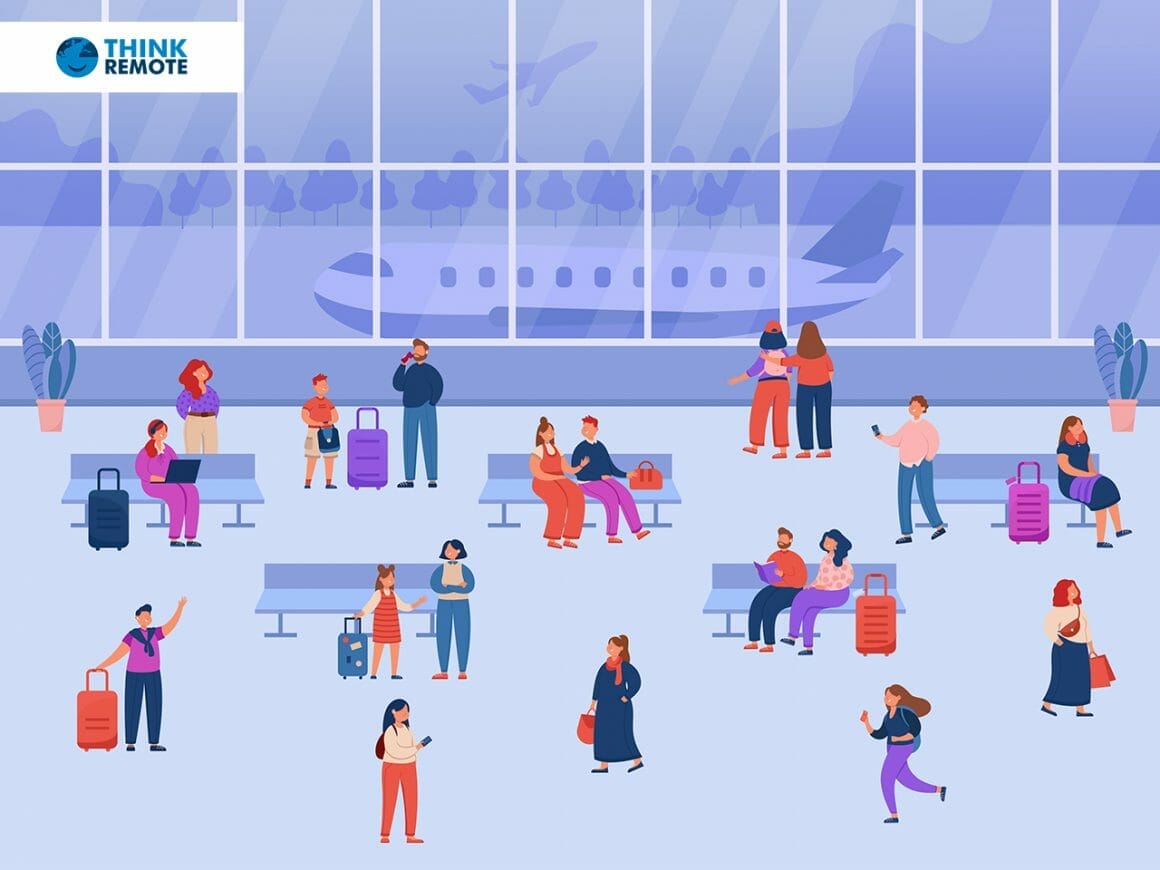Tour The World On $1000/Month With This List Of The Best Places to Work Remotely
Wouldn’t you like to work from a paradise island or in a remarkable European city?
Perhaps it’s rolling in your rental RV with a Wi-Fi hotspot visiting a different city every week. Or a stylish Airbnb in the romantic city of Paris. Or even in a chic coffee shop in New Zealand on your surf class break. People all around the world dream about escaping their tiny urban apartments or suburban homes and finally discovering the best place to work remotely.
Workers finally learned that they could do their jobs from anywhere. If there’s one silver lining to the chaotic explosion that was 2020, it’s that many of us learned – and especially our bosses learned – that we can work from anywhere we want. We can all be digital nomads.
Though you might already be familiar with the term, let’s break it down for those who aren’t. A digital nomad is a person who works remotely and uses technology to do their job. They aren’t tied down to a physical location since they are remote workers, so they are free to jump around the globe while making money through freelance gigs or contract remote jobs. They have all the flexibility in the world. In 2020, many office workers realized their discomfort working in person and developed their transition to full-time remote workers from whatever location they choose.
When traveling gets easier, where would you want to go first? Let’s discover the best locations in the world for remote work.
The Keys to Consider Before Becoming a Digital Nomad
So now you are sure you want to work abroad and experience complete flexibility in your workday. You can set up your schedule and have a sandwich on the beach during your Monday lunch breaks. It sounds fantastic, right? But before you start getting your things packed and decide to work around the world, keep in mind these key points:
- The cost of living: Though some locations have incredible landscapes and look culturally interesting, check their monthly expenditure. Several will seem perfect in the pictures (and they are!), but that’s not all that matters. Look into their uses and cost of living and stick to those where your expenses won’t outweigh your regular earnings.
- Wi-Fi connectivity: You are a digital nomad now, so you can’t afford to lose working hours due to a weak internet connection. Look for places where the local ISP guarantees a strong wifi signal, and you’ll enjoy perfect communication with your colleagues and clients.
- Coworking experiences: If you don’t love the idea of working alone in your tiny Airbnb, consider going to a coworking space. Research what coworking options you have nearby, considering the costs and the benefits the place provides. If you’re staying for more time, consider buying multi-day packs per month to save some cash!
- Tools and equipment! If you aim to become an official digital nomad, there are some must-have tools and equipment you’ll need to know to avoid any trouble. Ensure the location you choose is the best place to work remotely – at least for yourself – and try to fulfill all the goals you have for this adventurous experience. And remember to carry light luggage!
Find in this article all there is to know about remote work. and its advantages.
Best Cheapest Places to Move When Working Remotely

1. Thailand
- The average cost of living: $700 – 900 / month
- Coffee: local coffee shops are great. As you do your nomad work, bump between hostel coffee shops and coworking spaces to taste them, and you’ll get to meet new people!
- Wifi: strong internet connection
- Weather: you’ll never get too cold. Chiang Mai’s minimum temperature is around 10°C. The best time to visit is between October and April, with cool, pleasant temperatures and light breezes.
Full of misty mountains and colorful hills, this land is a playground for seasoned travelers, a paradise for shoppers, and enchantment for adventurers. Some curious travelers may expand their horizons with cooking courses or Thai massages, while others will go crazy for the various handicrafts and antiques.
Once you got through the mandatory quarantine period, networking opportunities are everywhere, from Facebook groups to coffee meetups or new coworking spaces like Punspace and Hub 53. And with its strong wifi and numerous boutique coffee shops, you’ll fall in love with Thailand immediately.
The crown of the top places to work remotely in Thailand is Chiang Mai, also called “The land of smiles.” With its natural splendor, favorable exchange rate, and abundance of outdoor activities, it’s no surprise Chiang Mai became the ultimate location for digital nomads to establish. Tucked away in the mountains of northern Thailand, you’ll find the perfect peaceful solitude to work.
No matter what time it is, you’ll always find fantastic food to try. With meals costing less than $1, you can afford to treat yourself like royalty in any fancy restaurant. So explore the night markets and taste Thailand’s authentic plates – I recommend you to go for traditional Thai meals, like pad thai or Khao sai.
2. Indonesia
- The average cost of living: $500-600 / month
- Coffee: Indonesia is among the top coffee-producing and exporting countries. It’s famous for its large variety of specialties. Go for the “kopi luwak” (most expensive coffee) and “kopi Mandailing.”
- Wifi: fast connectivity, around 100mbps+.
- Weather: mainly presents high temperatures. Between the two landmasses of Asia and Australia, you’ll face precipitations brought by monsoon winds.
This great country is composed of some 17,500 islands, of which more than 7,000 are uninhabited. Sumatra, Kalimantan, and western New Guinea cover almost three-fourths of Indonesia’s area; Celebs, Java, and the Moluccas account for most of the country’s remaining area.
One of this location’s advantages is how easily you can get a Visa. If you don’t stay longer than thirty days, you can have it for free – once you’ve done the paperwork. Instead, if you plan to stay in this location for longer than a month, you must opt for the $35 Tourist Visa purchased at the airport. This Visa is extendable up to a maximum of two months.
Indonesian population is highly varied. The national motto is “Bhinneka tunggle ika,” which means “Unity in diversity.” This place has emerged from the ongoing confluence between peoples, languages, and cultures. It includes more than 300 different ethnic groups, and the population practices most of the major world religions.
3. India
- The average cost of living: $300-400 / month
- Coffee: good coffee is similar to Indonesian coffees, particularly “Java Arabica.”
- Wifi: fast, over 100mbps+
- Weather: it varies dramatically. The north is cooler; the center is hot and dry; it has a tropical climate in the south.
Tourists mainly travel to India to experience its unique culture. You’ll get to know Hindu’s traditional way of living through its rituals, the delicious Indian food, the beautiful nature, or the variety of places you can visit. A trip to India is guaranteed to be an experience for life, which offers a look into the lives of 1.3 billion people who sometimes seem to live in an entirely different world.
As regards the Visa to visit this location, you can get a 60-day e-visa. If you’re planning to stay for longer to stop by every city, there’s also a six-month Tourist Visa. The bad news is you can’t stay in the country for more than six months out of each year. But don’t worry, there are thousands of things you can do in six months!
When you visit India, you may have some problems with the language. An interesting fact about this country is that the constitution officially recognizes twenty-one languages, aside from those 392 other – local – languages. Hindi is the most common language in India, used by only 40% of the population. The good news is that for many documents – primarily legal and scientific – Indians use English, spoken by 12% of the population. So surely you can buy a coffee without problems!
4. China
- The average cost of living: $600-700 / month
- Coffee: Yunnan, where much of China’s coffee grows, produces mainly Arabica coffee exported to Europe. Go for that one!
- Wifi: decent connectivity with 20mbps+. There are many blocked websites so try to get a VPN.
- Weather: since the territory is enormous, the country presents a large amount of weather. In the north, summer temperatures are around 25 C with freezing winters. At the same time, the summer in the south blows huge rain showers and dry cold winds in winter.
If you’ve never visited this location, you’ll realize it’s full of surprises. China is the third-largest country in the world by area. 33% of the Chinese territory is mountainous, and it holds the highest point in the world: Mountain Everest, measured at 29,029 ft. China has also been the world’s fastest-growing economy for the last thirty years and is currently known as the “world’s factory” – due to its production of concrete, steel, fertilizer, clothing, and toys.
But besides China’s massive growth during the last decades, it’s also rich in its culture. The country officially recognizes fifty-six ethnic groups, though the most significant group – the Han – occupies almost 91% of the whole population.
Chinese is the origin of the only surviving pictographic writing system. Its often considered the world’s most spoken and most difficult-to-learn language. It’s best if you go for the English and see how it goes. Through the development of Confucianism and other philosophies, tea culture, martial arts, poetry, calligraphy, and the imperial legacy, this region developed a culture of great depth. So, you’ll always have something new to know!
5. The Philippines
- The average cost of living: $400-500 / month
- Coffee: the Philippines is one of the few countries currently producing the four varieties of commercially viable Arabica, Robusta, Liberica, and Excelsa. Try them all!
- Wifi: slow, generally around 50 mbps+
- Weather: this region has a tropical maritime climate, meaning the weather is generally hot and humid.
This location has beautiful natural landscapes, active volcanoes, and various weather patterns in a tropical country in the Pacific Ocean. If you were looking for a country with thousands of options of where to live, then the 7,000 island archipelago of the Philippines is the best choice for you.
You can start your journey in Palawan, then move to Cebu for a few days. After enjoying the most out of these two locations, you could visit Luzon and continue island hopping for a whole year. And since your visa can be extendable indefinitely – with ninety days on arrival – you can stay as long as you desire!
Like the previous countries on the list, the Philippino culture is highly varied. There are over 170 languages spoken in this land. The most popular is Tagalog (Filipino), followed by English. So, relax traveler, you won’t have misunderstanding problems in this location!
6. Mexico
- The average cost of living: $700 – 1.000 / month
- Coffee: $1 (M$20). The coffee is local, organic, and small-scale without the need to find a local hipster shop.
- Wifi: it depends on your location. It’s recommended to work on coworking hubs to ensure having faster wifi.
- Weather: blissfully warm year-round. Summers may be harsh, but nothing that a bath in the sea wouldn’t fix.
Though Mexican enchiladas (corn tortilla folded or rolled, topped with chili sauce, and usually filled with chicken) are enough reasons to move to Mexico, this country has several other reasons to be one the best cheapest places to work remotely. You’ll learn Spanish, try extreme water sports, save money, and eat avocados every day while you work remotely. Sounds like the perfect plan, right?
The meals cost an average of $1-4. You can enjoy tacos with a margarita on a pristine beach or in the city – depending on where you chose to stay. After work, you have plenty of different activities to enjoy. If you go for a beach location, you can kitesurf or ride in a cenote through the Caribbean sea in your free afternoons!
Another perk of visiting Mexico is that its time zone is the same as in many U.S. cities, so you won’t have any trouble scheduling virtual meetings with your colleges. Plus, tourist visas last at least six months!
Mexico’s beaches are warm and full of visitors despite the pandemic, so put your sunscreen on and Vamos al caribe (let’s go to the Caribbean)!
7. Argentina
- The average cost of living: $500 – 700 / month
- Coffee: $0,7 ($100 Argentine pesos). I suggest you order ‘’un cortado’’ (core-tah-doh) espresso with a dash of steamed milk and foam. Cortado means to cut, so the coffee is “cut” with the milk.
- Wifi: though it will stress you some days, you’ll get things done at the right time
- Weather: I’ll be straightforward. Buenos Aires is hot in the summer months, and in the winter months, it’s cold enough to need a good coat.
If you are more of a social creature and need to settle in a place where fun things are always happening, Argentina is the perfect place for you to work remotely. This location is ideal for those looking for an affordable travel experience and beautiful landscapes with a rich culture and incredible weather. Take a look at this Nomad’s list of the top places to live, work and play digital nomads; Argentina holds the fourth position!.
Since you’re traveling as a digital nomad, Buenos Aires is the best city for you to live in. The current exchange US dollar rate is what makes Baires (as the locals call it) so ideal since it’s killing it against the Argentine peso. With no more than $1500 a month, you’ll have the chance to afford a luxurious apartment in a trendy neighborhood, try every fancy restaurant in the city, visit a coworking space now and then, and even escape to the outskirts of the town once a month.
The bad news is that you won’t be moving to Buenos Aires for the Internet speed since it’s pretty slow. But at 20mbps, on average, it gets the job done. Besides, you can rent a coworking space for $100 a month, so if you need to get things done fast, you know where to go. Plus, the city is only an hour ahead of the East Coast, meaning no Zoom calls at odd hours.
8. Colombia
- The average cost of living: $400-500 / month
- Coffee: what makes Colombian coffee so fantastic is its medium-body with a rich taste and citrus-like acidity. You can’t leave this region without trying their coffee.
- Wifi: it’s fast (100mbps+), though it can be slower outside major cities.
- Weather: it has annual temperatures above 23.9 C. The average yearly temperature is around 16.7 C.
Colombia is suitable land for all kinds of travelers. Through its center run the towering, snow-covered volcanoes and mountains of the Andes. At the same time, tropical beaches line most of the west. There are also deserts in the north and vast grasslands, called Los Llanos, in the east.
Colombia’s Visa to travel lasts ninety days on arrival and can only extend for a maximum of ninety more days per year.
An interesting fact about this country is its connection between different populations. Colombia sits in the northwestern part of the continent, where South America connects with Central and North America. That’s why people usually call it the “gateway to South America.” It’s also the largest country in Latin America and home to the world’s second-largest population of Spanish-speaking people.
Colombia has a rich cultural mix that makes the country’s food, music, dance, and art diverse and unique. This region resulted from three ethnic groups since most citizens descended from Indians, African, and European settlers.
9. New Zealand
- The average cost of living: $1,000 – 1,200 / month
- Coffee: $4,5 – 5. Wellington is a city renowned across New Zealand for its booming coffee culture.
- Wifi: the Internet speed won’t be incredible, but you’ll get Wi-Fi hotspots everywhere you go. Don’t worry; it won’t be a problem.
- Weather: the city is windy all year round, especially in winter (Jun-Aug). The warmer season is from December to April.
In the last few years, the country became a welcoming home base for 18 – to 30-year-olds looking for adventure. Surrounded by nature and fueled by creative energy, New Zealand is a fantastic location with a potent mixture of culture, history, nature, and cuisine. Digital nomads didn’t take long to notice this, and this location is now growing into one of the best places to work remotely.
What is the advantage of this location? New Zealand’s Working Holiday Visa program! With 22,050 free Wi-Fi hotspots, a million coffee shops to visit, and a fantastic plate of roasted lamb (held in high esteem worldwide), it attracts more people every day. You can choose to relax at the Oriental Bay, with a golden-sand inner-city beach, or dig into the many museums, galleries, and theatre shows that turn the city into a cultural scene. This location has everything!
What’s ideal about New Zealand is that most employers are open to hiring people overseas since they are used to receiving tourists looking for a job. And since most migrants need a job offer to get a work visa, finding a job will probably be your first task before you move. You’ll find several websites designed to connect remote workers with New Zealand employers; Workhere and Working in New Zealand are some of the best ones.
10. Germany
- The average cost of living: $960 – 1,300 / month in major cities. For rural locations, prices will be around $900-1,000 / month.
- Coffee: $3. The best-rated German coffee in 2021 was the Dallmayr Prodomo, with a natural and sweet flavor anyone would love to feel.
- Wifi: Germany is 25th worldwide in average Internet speed!
- Weather: winters can be harsh in Berlin (Oct-Mar); they can be cloudy with rain or hail. And always be prepared for snow!
Though this is the most luxurious location on the list, it’s worth mentioning it. Germany has a pretty diverse mix of sights you must see on your first visit. It’s full of culture. You’ll make an incredible experience out of it, filled with an eclectic blend of history, culture, and fantastic music; it’s a city that intrigues yet embraces visitors with open arms.
You can easily find a new job to try. You could go for the international startups and companies – to avoid language problems – since they target worldwide customers and usually speak English at the office.
What’s great about Germany is the city of Berlin, which is very friendly with foreigners. If you don’t speak German, you don’t need to worry, as almost everyone gets by with English. Berlin’s booming start-up culture and inclusive creative spirit attract more young professionals every day. The city’s residence permit is like a golden ticket for the self-employed who are looking to relocate to a fabulous location for a while – especially artists, freelancers, academics, and of course, remote workers.
Plus, since the city is situated almost in the middle of Europe, it makes it a great starting point to explore the rest of Europe when you can. You can reach anywhere within 24 hours by train.
Ready to Start Your Digital Nomad Lifestyle?
You know the costs, you know where to get a good internet connection, and you know the best coffee to order when working at a coworking space. Now it’s your time to decide what’s the best cheapest place to visit first!
Whether you chose to live like royalty – but under $1,000 – besides the beach, saving some money to travel during the weekends, or prefer to spend more cash to live in a fashionable cultural city and explore a thousand museums around your apartment, you’ll be living the high life. You’ll finally be working remotely from the best locations around the world. Depending on your personality and taste, these ideal landing spots will help you switch things up and try new experiences. Take control of your life and your schedule by exploring the world of remote work overseas.






